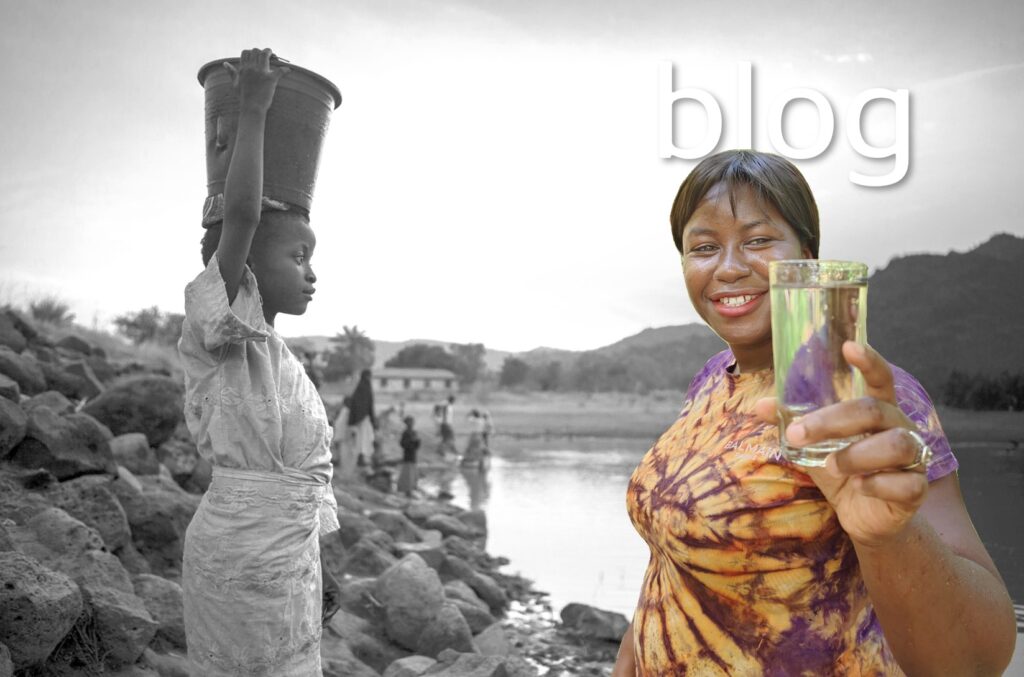Itohan Iyawe is from south-west Nigeria. Her childhood experience with water scarcity negatively impacted her education and health. However, while working with an NGO she got an opportunity to learn more about the struggles of rural communities and farmers who are affected by lack of access to water. This became a major concern for her as she was shocked to know that the water problem still exists, and it has even gotten worse. This moved her to start “Omitide” (Water has come), a program to make small-scale farmers and village communities aware of water management for all in the face of a dryer future.
by Itohan Iyawe,
WATER NIGHTMARES – A Childhood Under the Rock
In 1990, I was enrolled in a private primary school. Back then, we lived in a rented apartment in Ogun State, the Southwestern region of Nigeria.
Our city is called Abeokuta, which means “Under the Rock” because the state has many rock formations. Our streets lived up to this name as they were very bumpy and hardly accessible for vehicles.
We were privileged enough to rent an apartment with a water supply from the state water corporation. The water that reached our compound through a metal tap was drinkable and was billed monthly. As a backup, we stored the water in a concrete reservoir. When I returned from school, I used to have fun filling big bowls with water and taking baths under the sun with lots of splashes.
A daily struggle for water
Daily, you would find fifty or more women and children queuing and quarrelling around our water tap. And then, one day, the water supply suddenly stopped without any notice or reason.
Living on a rocky hilly terrain, no one in my direct neighbourhood could dig a well in their compound. Instead, we had to harvest rainwater into bowls and drums, but it wasn’t sustainable. I usually had to wake up at 5 am and walk for 10-15 km in search of water without any specific or predictable location in mind and along with my siblings did the same in the evening after school hours. Crossing major roads while carrying bowls of 15 to 25 litres of water on our heads we were exposed to the risk of being hit by cars or trucks.

Sickness and stress – the cost of water scarcity
Water is precious and for the same reason, the housing compounds with wells were locked to prevent access to outsiders. Water levels of wells are usually low in dry seasons. It gets mixed with mud, and we had to put alum, a chemical compound that makes dirt to settle at the bottom and sieve before using it. At times, we became sick, almost everyone had diarrhea.
Having to go out and fetch water every day was stressful and frustrating. But when I realized there was no other solution, this routine became a part of my life. However, it negatively affected my results in school, resulting in me not reaching the minimum grades to qualify for admission into the university.
Water woes across Nigeria
Between 2008 and 2015 I changed 4 apartments, and in each place, I faced the same difficulties in accessing water. The neighbours had, on numerous occasions, quarrelled about others using the water for which they had endured a great deal of hardship to procure. I now realize that water scarcity was not just limited to Abeokuta or Ondo state but was spread widely across Nigeria.
Later in 2015, I was lucky enough to find an apartment that had a well that was connected to an overhead water tank. However, the water we received could only be used for household purposes. I still had to buy plastic-packed water for drinking, and it was expensive.
The turning point – working with springboard
It was in 2018 when I started working with Springboard, founded by Lawrence Afere (a 2012 kanthari), an NGO that focuses on organic farming. I got an opportunity to work closely with rural communities and farmers. Here I learned more about their struggles due to the scarcity of water.
Despite all the water challenges I encountered as mentioned above, I was able to sail through life, but some of my friends could not. Individuals residing in rural communities, unable to either purchase or obtain access to water, continue to confront identical challenges. It saddens me to witness people squandering this precious resource.
Water for all – a human right
Having access to clean water is a human right! This motivated me to start my organization, “OMITIDE” meaning WATER HAS COME. A program will be implemented to educate individuals on the responsible utilization of water, granting them the gratifying experience of readily available access to this essential resource.
Do you, like Itohan, want to start an impact making organisation?
Then the kanthari Impact leadership course could be the best place for you.
Check out the following website and apply to become a participant in the scholarship based course that starts in April:
https://www.kanthari.org/admissions/
If you missed the kanthari TALKS, no problem, you can watch them on:
https://www.kantharitalks.org/



